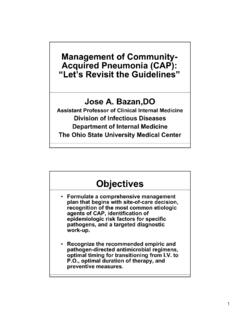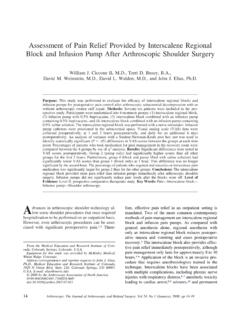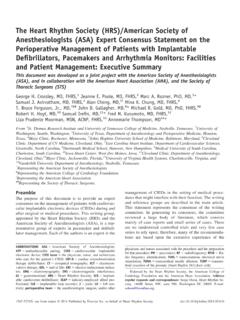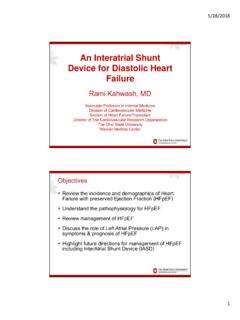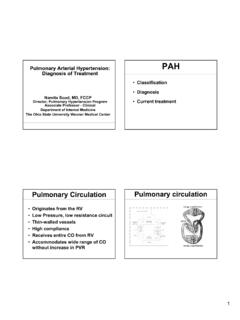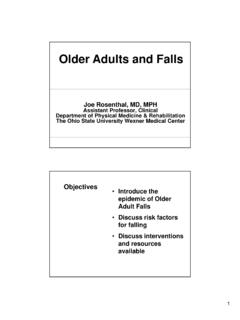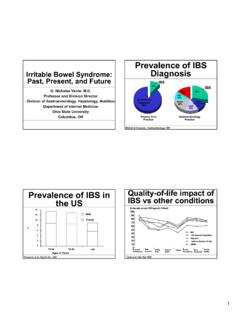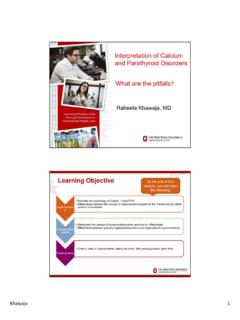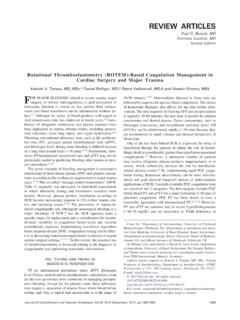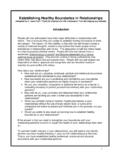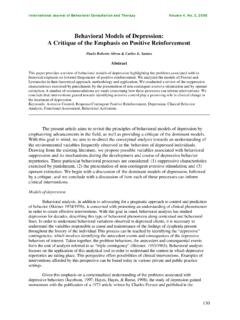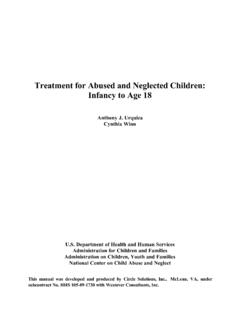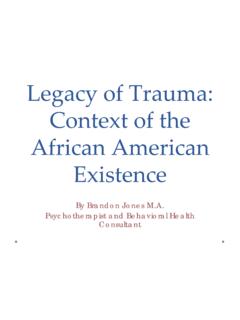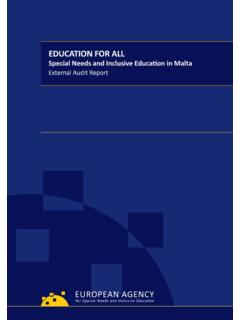Transcription of Elder Abuse and Neglect Final - Handout - OSU Center for ...
1 Elder Mistreatment Lauren Southerland, MD. Assistant Professor Director of Geriatric Emergency Care Department of Emergency Medicine The Ohio State University Wexner Medical Center Older adults suffering from 29% of older adult Elder Abuse visit the ED two visits to the ED are times a year. (Dong 2013) for falls (CDC). 5 million older adult Neglect from caregivers ED visits a year for is the Abuse type most associated with repeat injuries. (Betz 2014) ED visits. (Dong 2013). 1. MD pitfalls to identifying Abuse / Neglect : Preponderance of injuries Patients unlikely to voluntarily report Lack of education Poor documentation No easy validated screening assessments Cultural barriers Your primary care clinic: An older woman who is Mandarin-speaking only has lost 15lbs since her last visit. Family, who are translating, say she just doesn't want to eat anymore and they want to know if she is dying.
2 2. Is this patient safe to go back home? Risk factors for Abuse / Neglect Types of mistreatment Signs of Neglect on exam When should a doctor intervene? Types of Elder Mistreatment Physical Abuse Sexual Abuse or Abusive Sexual Contact Emotional Abuse Neglect Abandonment Financial Abuse or Exploitation 3. Physical Abuse occurs when an Elder is injured ( , scratched, bitten, slapped, pushed, hit, burned, etc.), assaulted or threatened with a weapon ( , knife, gun, or other object), or inappropriately restrained. 5-10% of caregivers of patients with dementia report episodes of physical Abuse in anonymous surveys. Sexual Abuse or Abusive Sexual Contact is any sexual contact against an Elder 's will. This includes acts in which the Elder is unable to understand the act or is unable to communicate. Abusive sexual contact is defined as intentional touching (either directly or through the clothing), of the genitalia, anus, groin, breast, mouth, inner thigh, or buttocks.
3 4. Psychological or Emotional Abuse Examples include humiliation or embarrassment;. controlling behavior ( , prohibiting or limiting access to transportation, telephone, money or other resources); social isolation; disregarding or trivializing needs; or damaging or destroying property. Abandonment is the willful desertion of an elderly person by caregiver or other responsible person. May be left at a hospital, nursing home, or public location Person may appear alone, confused, or wandering. 5. In the Emergency Department 76-year-old man is brought in by paramedics. He is unaccompanied and disheveled. The medic team says that they found him in a cold apartment with the heat off. The home health worker called 911 because she found him confused and not acting right. The patient is not oriented to time or place, and says his name is Frank.
4 In the ED: Patient rewarmed, delirium improved. Admitted for Social worker evaluation. Financial Abuse or Exploitation is the unauthorized or improper use of the resources of an Elder for monetary or personal benefit, profit, or gain. Examples include forgery, misuse or theft of money or possessions; use of coercion or deception to surrender finances or property; or improper use of guardianship or power of attorney. Only 1 in 44 cases is every reported Affects at least 5% of older adults 6. Neglect is the failure or refusal of a caregiver or other responsible person to provide for an Elder 's basic physical, emotional, or social needs, or failure to protect them from harm. Examples include not providing adequate nutrition, hygiene, clothing, shelter, or access to necessary health care; or failure to prevent exposure to unsafe activities and environments.
5 7. Elder Abuse /mistreatment- Effects Welts, wounds, and injuries ( , bruises, lacerations, dental problems, head injuries, broken bones, pressure sores). Persistent physical pain and soreness Nutrition and hydration issues Sleep disturbances Increased susceptibility to new illnesses (including sexually transmitted diseases). Exacerbation of preexisting health conditions Increased risks for premature death Fear and anxiety reactions, PTSD, and learned helplessness Have you relied on people for any of the following: bathing, Yes 1. dressing, shopping, banking, or meals? No 0. Has anyone prevented you from getting food, clothes, Yes 1. medication, glasses, hearing aides or medical care, or from No 0. being with people you wanted to be with? Have you been upset because someone talked to you in a way Yes 1. that made you feel shamed or threatened?
6 No 0. Has anyone tried to force you to sign papers or to use your Yes 0. money against your will? No 1. Has anyone made you afraid, touched you in ways that you did Yes 1. not want, or hurt you physically? No 0. Doctor: Elder Abuse may be associated with findings such as: Yes 1. poor eye contact, withdrawn nature, malnourishment, hygiene No 0. issues, cuts, bruises, inappropriate clothing, or medication compliance issues. Did you notice any of these? 8. Why do paramedics not report? Reasons for not reporting included 1)unsure which authorities take reports;. 2)unclear definitions;. 3)unaware of mandatory reporting laws; and 4)lack of anonymity. 5)Ninety-five percent of respondents stated that training related to Elder Abuse was not available through their EMS agency. Prehosp Disaster Med 1995 Apr-Jun;10(2):96-100.
7 What can we do to increase detection/reporting? Add a domestic Look up local violence/ Elder resources mistreatment section Partner with local to your templates/EMR agencies to do High suspicion home visits/check Ask ups Education of ancillary Have fliers in your staff waiting room 9. We want all our older adults to be well loved, well cared for, and well. PROTECTING THE ELDERLY: LISTEN, DOCUMENT, AND. REPORT. Kelly C. Patton, Esq. Columbus, Ohio 10. LISTENING. Elders are often very confused when in the ER or Doctor's office Confusion does not constitute an entirely poor historian Ask the right questions; sometimes the same question in different ways Taking time with the Elder is essential Gains the Elder 's respect: Even persons suffering from moderate to severe dementia know when they are being treated like an object.
8 Allows the proper information to be gathered to assist the Elder or prosecute abuses Treat the elderly patient like you would treat your parent DOCUMENTATION. Key to getting the correct help for an Elderly Patient and greatly assists in the prosecution of Abuse , Neglect , and exploitation. Carefully document the following: Physical injuries Symptoms reported by the Elder Mannerisms Elder 's responses to caregivers Hygiene: recent or long-standing Infections Malnutrition/hydration NOTE: Depending on the severity of the medical condition and/or dementia of the Elderly patient, the information you collect from the Elderly patient could be last valuable piece of information used to prosecute a perpetrator and/or obtain the right help . 11. DOCUMENTATION CONTINUED. Ask the Elderly Patient: Identifying information should include family members/dynamics, military history, employment history, mental health hospitalizations or community mental health agencies With whom does he/she reside?
9 Who helps provide care, how often does caregiver help? Summarize stories told by the Elderly patient that involve recent occurrences even if they seem somewhat unreal. Question Caregivers Refrain from quickly accusing Observe interactions between caregiver(s) and the Elder Is caregiver/family member(s) avoiding questions or being defensive? How is overall health of Caregiver? MANDATORY REPORTING. Many States have mandatory reporting laws requiring various professionals to report Abuse , Neglect , and/or exploitation of the Elderly. Ohio requires reporting of Healthcare, Medical, Dental, and Mental Health Service Providers along with many other professionals. Reporting in Franklin County: In Ohio but outside of Franklin county: 12. MANDATORY REPORTING. Be aware of the reporting law in your area: To whom are you required to report and how.
10 50 states including territories of Guam and Puerto Rico. Check the following National Adult Protective Services Website: content/uploads/2016/05/Mandatory- Reporting-Chart-Updated-December-2015- Foreign Countries: Start with this website: The site is a bit outdated but may be a good start OTHER GOOD SOURCES. Local Authorities: Police departments handle crimes involving domestic Abuse (Choices in Columbus, Ohio), theft, narcotics Domestic Violence Networks in your area State Attorney General Offices Ohio has a department specializing in Elder issues Citizen Advocacy Groups Office on Aging Disability Rights Mental Health Boards and/or state Mental Health Ombudsman offices Department of Health Job and Family Services Medicaid Fraud Unit Developmental Disabilities Boards 13. NAPSA. Author: CDC/Amanda Mills GETTING THE RIGHT HELP.
